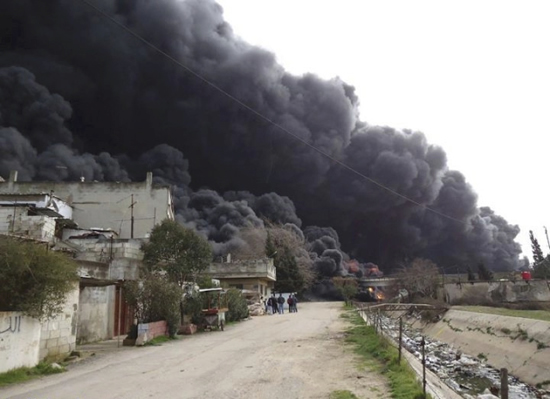Morning Bell: Fighting to the Death in Syria
Mike Brownfield /
Fifty-five explosions rocked the city of Homs, Syria, in the span of 15 minutes. Artillery and automatic gunfire pound neighborhoods. Snipers perch on rooftops, firing at civilians. Families crowd in makeshift basement shelters to avoid the violence, and the military is reportedly on a campaign to flatten every single neighborhood where opposition can be found. This is the state of play under Bashar al-Assad’s regime of terror, and those who stand against him have died by the thousands in an 11-month revolt against the government. Amid these horrid conditions, there are actions the United States can and should take to help bring aid to this suffering people.
The explicit details of the conditions in Homs come from the eyewitness account of CNN correspondent Arwa Damon, one of the few reporters in Syria. “You can just imagine the situation people are under,” she reports, “not just from a dangerous standpoint, but the psychological impact that this is having on these families, these civilians, who are stuck in these areas unable to get to safe ground or unable to get adequate medical treatment should they be hit in these attacks.” The violence has taken its toll. To date, the regime has killed more than 7,000 people, most of whom were unarmed demonstrators, has jailed more than 10,000, and “disappeared” thousands more. Yet opposition to Assad continues in the face of escalating attacks, with some indications that the military is losing ground as the army loses thousands of defectors.
As the suffering continues, the international community has done precious little to halt the violence. The Arab League sent an observer mission to Syria but withdrew when the Assad regime failed to keep commitments to halt its repression. The United Nations has been ineffectual, with Russia repeatedly vetoing efforts by the Security Council to take action. China, which also vetoed U.N. action, is sending a diplomat to Syria but opposes regime change. And today, the U.N. is scheduled to vote on a resolution to strongly condemn the human rights violations and to back an Arab League plan to end the conflict, but the action would be non-binding, merely sending a message to the Assad regime, with no teeth attached.
Yesterday, Assad called for a national vote on a new constitution that would create a multiparty system in the country, but it’s too little, too late from the man whose family has ruled the country as an autocracy for 40 years — not to mention the fact that Assad has a long track record of breaking his promises to usher in reforms. Case in point: despite the call for a referendum, forces today began an attack on the city of Daraa. Assad’s belated concessions now are likely to have little effect in stemming the rising tide of opposition, but has been embraced by his close ally Russia, which continues to insist that he is open to political compromise.
The Heritage Foundation’s James Phillips writes that the Assad regime is on borrowed time — the vast majority of the Syrian military, though hundreds of thousands strong, is becoming increasingly unreliable. The government has only two dependable units — the Republican Guards and the 4th Armored Brigade, both of which are being stretch thin. In short, the beleaguered tyrant is slowly losing his grip on power all while the Free Syrian Army, consisting mostly of military deserters, is becoming a more organized opposition force. Desperate, the Syrian government has turned to Iran, and there are reports that the Quds Force, a special unit of Iran’s Revolutionary Guards, are fighting beside Assad’s forces.
Amid this environment, Phillips warns that the United States should not supply arms to the resistance or offer direct military intervention — an outside peacekeeping force would only get caught in the conflict and make matters worse. However, he advises that the United States can offer valuable assistance:
The U.S. can play a constructive role in the conflict by supporting efforts to deliver humanitarian aid. The U.S. should also be working closely with regional partners, especially Turkey, both to help speed the transition to a new, legitimate government and to continue diplomatic pressure and international sanctions against the Assad regime.
Ultimately, the best way forward will be for the Syrian people to win their own future without direct foreign intervention. It is with great valor that they continue to fight against Assad and to weather the storm of his violent oppression in hopes of a better tomorrow. When the smoke lifts, one can only hope that the cloud of terror and death goes with it, and that a government with true legitimacy is formed.
Quick Hits:
- Congress is a step closer to passing a $150 billion economic plan that will extend the payroll tax holiday and unemployment benefits. Negotiators reached agreement on the plan early today, and a vote could come on Friday.
- Secret three-way talks among the United States, Afghanistan, and the Taliban have begun, Afghan President Hamid Karzai told The Wall Street Journal.
- President Obama is considering cutting the U.S. nuclear arsenal by as much as 80 percent, a plan that Rep. Trent Franks (R-AZ) says is “reckless lunacy.”
- New York City police are beefing up security around Israeli government offices and synagogues as a precaution in light of increased tension with Iran over its pursuit of nuclear weapons.
- A recent White House decision to allow cabinet secretaries to raise money for political organizations could coerce individuals or organizations into financially supporting the president’s reelection in order to avoid a regulatory backlash. Read more about it on The Foundry.
Click here to view this post in Spanish at Libertad.org.

